September 5, 2017
Gaukhar Mukhatzhanova
The following is an excerpt from Arms Control Today.
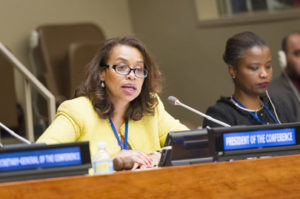
Conference President Elayne Gomez Whyte
The Treaty on the Prohibition of Nuclear Weapons has been hailed by supporters as a historic achievement that they hope will be, in the words of the Hiroshima atomic bombing survivor Setsuko Thurlow, “the beginning of the end of nuclear weapons.” The treaty is the first international agreement that prohibits the use, possession, deployment, and stationing of nuclear weapons for all states-parties and challenges the legitimacy of nuclear deterrence policies. It opens for signature at the UN General Assembly in New York on September 20 and enters into force 90 days after the deposit of the 50th instrument of ratification.
Dismissed by the nuclear-armed states and their allies, the impact of the treaty will become evident only over time. The treaty’s negotiators do not have illusions that the new instrument will produce immediate results in reducing nuclear risks or nuclear weapons. Instead, the aim is to delegitimize nuclear weapons and make it more difficult for states to continue to rely on nuclear weapons as part of their military and foreign policy strategies.
Borne of a movement focused on the humanitarian impact of nuclear weapons use, the treaty commits its states-parties to conduct environmental remediation and provide assistance to victims of nuclear weapons use or testing under their jurisdiction and establishes the responsibility of states that use or test nuclear weapons to provide assistance to other affected parties. Further, the treaty mandates the destruction of nuclear arsenals, with a view that the details of nuclear weapons elimination would be negotiated at a later date.
Negotiations of the prohibition treaty, mandated by UN General Assembly Resolution 71/258, took place at a difficult time and in peculiar circumstances. North Korea had accelerated its nuclear weapons program, conducting its fourth and fifth nuclear tests in January and September 2016 and demonstrating growing missile capabilities in recent months. Russian leadership in recent years had made cavalier pronouncements on the use of nuclear weapons. And statements by the new U.S. president, Donald Trump, raised concerns about increased possibility of nuclear weapons use as he demonstrated little knowledge of nuclear weapons issues combined with a proclivity for bombastic statements and threats.
For the proponents of the ban, these developments underscored the urgency of negotiating a treaty to prohibit the use and possession of nuclear weapons. For the opponents, these issues only added to the list of problems the prohibition treaty cannot solve.
Although the prohibition treaty was negotiated by mostly like-minded states, the deliberations did not escape some of the familiar problems and disagreements plaguing the debates at nuclear Nonproliferation Treaty (NPT) and International Atomic Energy Agency (IAEA) meetings, which affected some of the treaty’s provisions. A short negotiation time frame and the lack of a preparatory process, along with the absence of a number of states traditionally active in disarmament and nonproliferation forums, also influenced the process and substance of the talks.
Read the full article at Arms Control Today
CNS Events and News on the TPNW
- The Role of NWFZs and the TPNW Towards Global Nuclear Weapon Elimination
 A video with speaker María Antonieta Jáquez Huacuja, Deputy General Director for Disarmament, Non-Proliferation, and Arms Control, Mexican Secretariat of Foreign Affairs.
A video with speaker María Antonieta Jáquez Huacuja, Deputy General Director for Disarmament, Non-Proliferation, and Arms Control, Mexican Secretariat of Foreign Affairs. - CNS Nonproliferation Short Course Video Resource Library
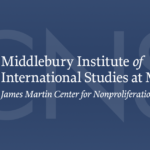 A subset of CNS videos intended to supplement CNS organized short courses with the aim of allowing course participants to obtain detailed knowledge on the topics listed.
A subset of CNS videos intended to supplement CNS organized short courses with the aim of allowing course participants to obtain detailed knowledge on the topics listed. - The Treaty on the Prohibition of Nuclear Weapons (TPNW)
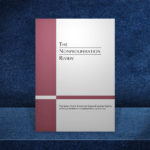 The Treaty on the Prohibition of Nuclear Weapons (TPNW): a virtual special issue of the Nonproliferation Review.
The Treaty on the Prohibition of Nuclear Weapons (TPNW): a virtual special issue of the Nonproliferation Review. - Ambassador Elayne Whyte Gomez on Negotiating the TPNW: A View from 2018
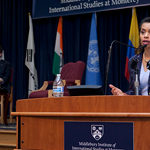 Ambassador Elayne Whyte Goméz is interviewed about her presiding over the negotiation of a legally binding instrument to ban nuclear weapons—the Treaty on the Prohibition of Nuclear Weapons (TPNW)
Ambassador Elayne Whyte Goméz is interviewed about her presiding over the negotiation of a legally binding instrument to ban nuclear weapons—the Treaty on the Prohibition of Nuclear Weapons (TPNW) - The Treaty on the Prohibition of Nuclear Weapons: What’s Next
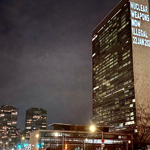 WEBINAR: Speakers address the treaty’s impact on nuclear disarmament and the international nonproliferation regime.
WEBINAR: Speakers address the treaty’s impact on nuclear disarmament and the international nonproliferation regime. - Ambassador Gómez Reflects on Negotiating the Nuclear Weapons Ban Treaty
 VIDEO: Seminar with Ambassador Elayne Whyte Gómez.
VIDEO: Seminar with Ambassador Elayne Whyte Gómez. - The Nuclear Weapons Prohibition Treaty: Negotiations and Beyond
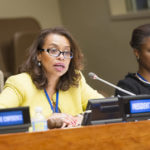 Gaukhar Mukhatzhanova examines the new nuclear disarmament treaty in this month’s Arms Control Today.
Gaukhar Mukhatzhanova examines the new nuclear disarmament treaty in this month’s Arms Control Today. - MIIS Alumna Presides Over Negotiation of Nuclear Weapons Ban Treaty
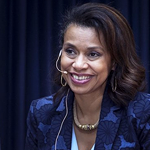 MIIS alumna Ambassador Elayne Whyte Gomez facilitated the adoption of a treaty banning nuclear weapons.
MIIS alumna Ambassador Elayne Whyte Gomez facilitated the adoption of a treaty banning nuclear weapons.
